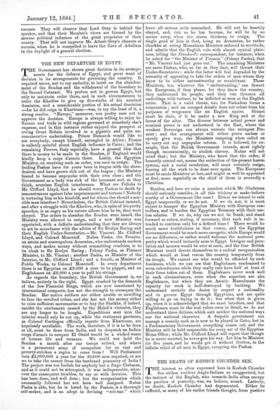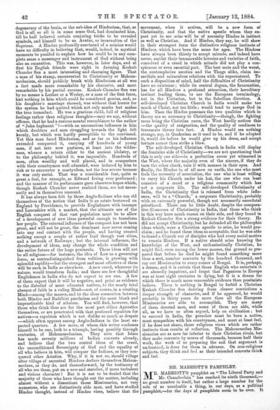THE DEATH OF KESHUB CHUNDER SEN.
THE interest so often expressed here in Keshub Chunder Sen strikes resident Anglo-Indians as exaggerated, but the instinct of the English, who towards India often occupy the position of posterity, was, we believe, sound. Latterly, no doubt, Keshub Chunder had degenerated. Either he suffered, as many of his earlier friends thought, from positive
degeneracy of the brain, or the sub-idea of Hindooism, that, as God is all, so all is in some sense God, had dominated him, till he half believed certain conjuring tricks to be revealed symbols, and himself to be an Avatar, or incarnation of the Supreme. A Hindoo profoundly convinced of a mission would have no difficulty in believing that, would, indeed, in mystical moments be puzzled to explain how he could be in any com- plete sense a messenger and instrument of God without being also an emanation. This was, however, in later days, and at first his English friends were right in deeming Keshub Chunder Sen a most interesting and charming figure. That a man of his stamp, unconverted to Christianity or Mahom- medanism, should publicly break with Hindooism at all was a fact made more remarkable by his character, and most remarkable by his partial success. Keshub Chunder Sen was by no means a Luther or a Wesley, or a man of the first force, had nothing in him which could be considered genius, and, as his daughter's marriage showed, was without that horror for the system he had quitted which not only marks but makes the true iconoclast. He was a gracious child, full of religious feelings rather than religious thoughts—may we say, without offence, that he had a curious mental resemblance to the author of "John Inglesant "?—with an unconscious influence in him which doubters and men struggling towards the light felt keenly, but which was hardly perceptible to the convinced. Yet this man faced Hindooism, and as far as his influence extended conquered it, carrying off hundreds of young men, if not into new pastures, at least into the wilder- ness, whence a return either to the ancient idolatry, or to the philosophy behind it, was impossible. Hundreds of men, often wealthy and well placed, and in comparison with their countrymen well educated, were induced by him to risk or to encounter a martyrdom, not the less severe because it was only social. That was a considerable feat, quite as great a feat, for example, as Edward Irving ever performed ; and the manner of its performance gave observers hopes which, though Keshub Chunder never realised them, are not neces- sarily and in themselves unsound. It has always been felt by those Anglo-Indians who can rid themselves of the notion that India is an estate bestowed on England by Providence, to provide Englishmen with incomes and Lancashire with a market, that the ultimate use of the English conquest of that vast population must be to allow of a development of new ideas powerful enough to transform her people. The external influence of the conquest has not been great, and will not be great, the dominant race never coming into any real contact with the people, and having created nothing except a couple of rather frail though vast cities, and a network of Railways ; but the internal influence, the development of ideas, may change the whole condition and the entire future of the huge peninsula. These ideas will not be all religious—for instance, the idea of Law as a governing force, as contradistinguished from volition, is growing with splendid rapidity—but the strongest and most effective of them will be such in India as elsewhere. A new creed, whatever its nature, would transform India ; and there are few thoughtful Englishmen in India who do not expect to see one. A few of them expect that it will be negative, and point as evidence to the disbelief of most educated natives, to the nearly total absence of faith in a ruling Mind—not, of course, in a creating Mind—among the masses, and to the close connection between both Hindoo and Buddhist pantheism and the most blank and impracticable kind of atheism. You will find, however, that those who think thus are for the most part either Agnostics themselves, or are penetrated with that profound repulsion for natives—a repulsion which is not dislike so much as despair —which often appears among Anglo-Indians in the least ex• pected quarters. A few more, of whom this writer confesses himself to be one, look to a triumph, lasting possibly through centuries, of Mahommedanism. They note that Islam has made seventy millions of Indian converts already, and believe that the two central ideas of the creed, the unconditioned Sovereignty of God and the equality of all who believe in him, will conquer the Indians, as they con- quered other Asiatics. Why, if it is not so, should village after village of ancestral Hindoos declare themselves Mahom- medans, as they do, and thenceforward, by the testimony of all who see them, put on a new and statelier, if more turbulent and vicious character? But it is not to be denied that the majority of those who have thought out the matter, including almost without a dissentient those Missionaries, not very numerous, who are distinctively able men, and have studied Hindoo thought, instead of Hindoo vices, believe that the
movement, when it arrives, will be a new form of Christianity, and that the native apostle whom they ex- pect yet to see arise will be of necessity Hindoo in instinct as well as Christian. And if Hindoo, they say, he will show in their strongest form the distinctive religious instincts of Hindoos, which have been the same for ages. The Hindoos have always been thirsty to accept miracle, and indeed have never, amidst their innumerable heresies and varieties of faith, conceived of a creed in which miracle did not play a con- spicuous or even essential part. The best sects and the worst, the contemplative ascetics and the Thugs alike, claim im- mediate and miraculous relations with the supernatural. To such a disposition of mind, half the difficulties of Christianity have no existence ; -while its central dogma, the Incarnation, has for all Hindoos a profound attraction, their hereditary instinct leading them, to use the European terminology, not in the Unitarian, but in the Sabellian direction. A self-developed Christian Church in India would make too much of Christ, not too little ; would tend to merge God in him. Then the Hindoo possesses the two qualities which in theory are so necessary to Christianity—though, the fighting races being the Christian races, the West hardly notices this —the quality of resignation, and the quality of readiness to transmute theory into fact. A Hindoo would see nothing strange, say, in Quakerism as it used to be, and if he adopted it, would die before he would give up his dress, and accept torture sooner than strike a blow.
The self-developed Christian Church in India will display the feminine side of Christianity—we are not questioning that this is only one side—in a perfection never yet witnessed in the West, where the majority even of the sincere, if they do turn the other cheek, turn it with menace in their eyes. And finally, the Hindoo is, of all men on earth, the one who most feels the necessity of association, the one who is least willing to carry his Church under his hat, the one who can least conceive of a creed or a religions community which has not a corporate life. The self-developed Christianity of India, the Christianity that is released from white influ- ence, will be a "Church," a corporate Christianity, probably with an extremely powerful, though not necessarily sacerdotal priesthood. There can be little doubt, despite the compara- tive ill-success of Christianity in India, that those who think in this way have much reason on their side, and they found in Keshub Chunder Sen a strong evidence for their theory. He did not accept Christianity, but he defended all the philosophic ideas which, were a Christian apostle to arise, he would pro- claim ; and he found these ideas so acceptable, that he was able to found a Church out of disciples who had every social motive to remain Hindoos. If a native should arise knowing the knowledge of the West, and enthusiastically Christian, he might find, even among the lower masses, the ground so pre- pared that before he died he might found something more than a sect, number converts by the hundred thousand, and ray out Missionaries to every corner of Bengal. It is, perhaps, a dream, and it is certain that those English who entertain it are absurdly impatient, and forget that Paganism in Europe was at least eight centuries in dying, but it is a dream for which there is much more reasonable evidence than pessimists believe. There is nothing in Bengal to forbid a Christian Keshub Chunder Sen deriving from clearer convictions a deeper strength of character, and if he appeared, he would probably in thirty years do more than all the European Missionaries are able to accomplish. They are many of them devoted men, and some of them are able, while all, as we have so often argued, help on civilisation ; but to succeed in India, the preacher must be born a native, must sympathise with his countrymen, and must at least feel, if he does not share, those religious views which are rather instincts than results of reflection. The Mahommedan Mis- sionaries are as men far inferior to their Christian rivals, but they make converts by scores of thousands, because half their work, the work of so preparing the soil that argument is understood, is done for them in advance. On non-religious subjects, they think and feel as their intended converts think and feel.







































 Previous page
Previous page